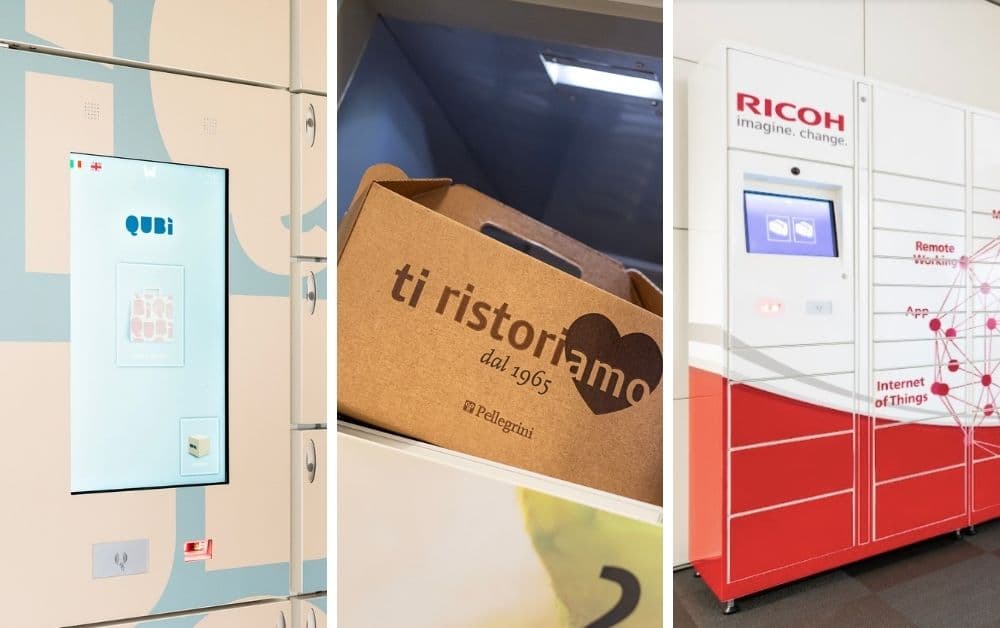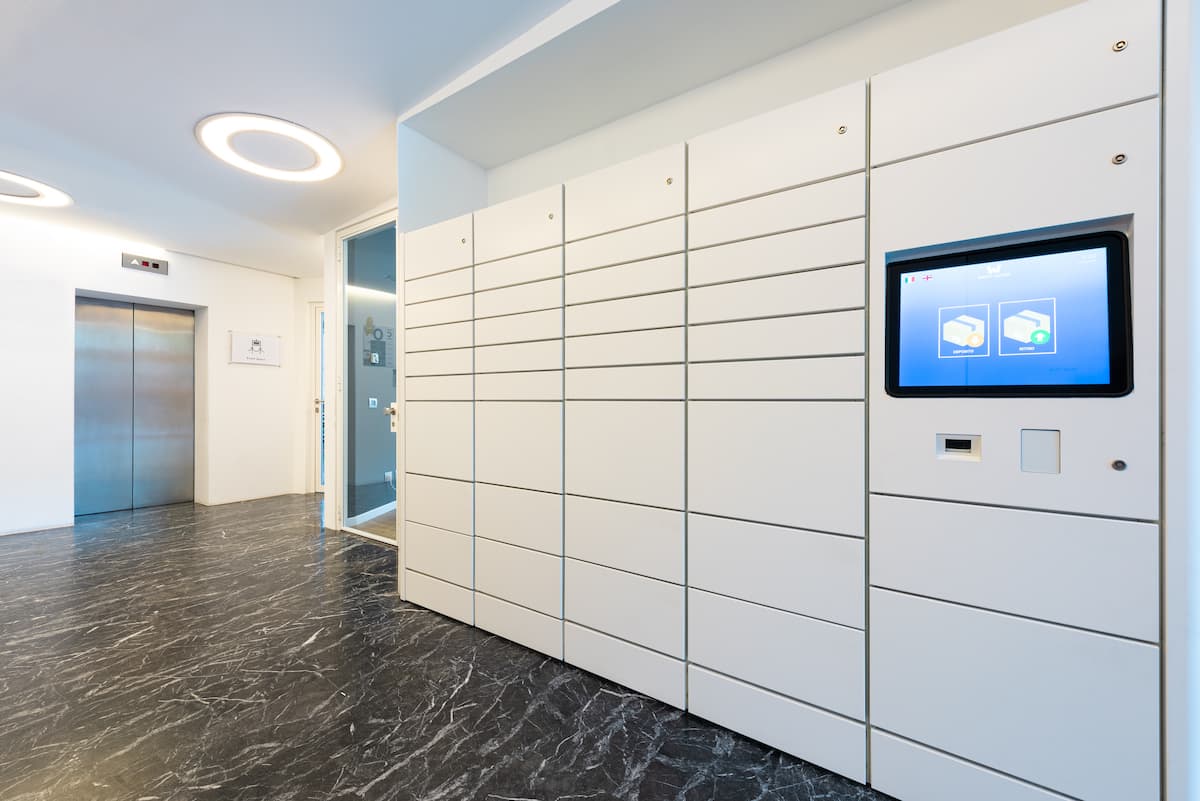Smart Lockers for corporate welfare: from online orders to canteen 4.0, the use cases for the welfare of employees and collaborators
- 11 August 2021
- Elena Federici

In recent years, Italian companies have been increasingly committed to putting in place corporate welfare initiatives, i.e. the set of practices that companies and employers adopt to increase the well-being of workers and their families.
A study published by ISTAT (the Italian National Institute of Statistics) in June 2020 (but referring to the two-year period 2016-2018) and taking into consideration 280,000 Italian companies highlights that in the period in question as many as 69% of companies introduced some kind of corporate welfare measure.
It is safe to assume that, years later, the percentage of companies that have engaged in corporate welfare initiatives has increased significantly, partly as a result of the COVID-19 crisis that has necessarily led companies to question a number of dynamics and processes related to life in the company.
After a long period of working remotely, and with several variables still in play (schools that may close, possible periods of isolation, the need for distancing, etc.) today it is more necessary than ever to give workers the tools to better manage their time without difficulty, providing services that improve the quality of the environment and the work experience.
Corporate welfare is not only a set of attentions on the part of companies for the benefit of employees, but it is also – and increasingly so – an attractive element for personnel searches and a motivational and loyalty tool for workers: being able to have certain benefits is becoming a must-have for an increasing number of people.
Even the State, in fact, is working to facilitate workers in the management of daily tasks through tax incentives and bids dedicated to corporate welfare.
The corporate welfare interventions put in place by companies are different and range from the simplest initiatives (meal vouchers, fuel vouchers) to more structured services (corporate crèches, insurance plans, company outlets, training courses, mortgage benefits) or recreational in nature (company gyms, company libraries, tickets for cultural events, etc.).
As part of our experience with virtuous initiatives implemented by companies for the benefit of their employees, we highlight the introduction of Smart Lockers, fully automated lockers that make various processes easier, safer and more immediate.
Here are some use cases already implemented, in which Smart Lockers have successfully supported the corporate welfare initiatives of companies that have chosen them!
Smart Lockers use as an employee locker (Daily Lockers)
In this case, smart lockers are used to store personal items (purse, keys, jacket, mug…) and work tools (documents, notepads, but also laptops, tablets or company smartphones to be left charging for example during the lunch break).
It is also useful for those who need to have a change of clothes available, for those who go to the gym right after the office and need to take their bag already prepared, or for those who go to work by bike, kick scooter or motorcycle and need to have their helmet and/or any other protection with them.
In this way all personal items are completely safe, do not clutter and do not run the risk of being lost / stolen.
Among the companies that have chosen our lockers as a personal space for their employees: PWC, Maire Tecnimont and Autostrade per l’Italia.

Smart Lockers for postal management (Parcel Lockers)
More and more people are shopping online and, for some, buying on the internet has become the predominant way of shopping.
With the return to the office, many people find themselves with the need to have packages and orders delivered to their workplaces; some companies give this possibility to employees by relying on receptionists who find themselves having to manage a continuous flow of incoming packages with various inconveniences:
- problems of security, logistics and aesthetics (parcels accumulated in reception)
- loss of time in having to open to the courier, sign for the reception of the package, etc.
- loss of time in having to notify the employee of the arrival of the shipment, keep it in custody and then deliver it
- possibility of lost packages / delivery of the package to the wrong recipient
- queues to collect the parcels
The use of the Smart Locker as a Parcel Locker in this case becomes providential: these are fully automated lockers that do not require dedicated staff for their management; the courier simply needs to introduce the package into the compartment assigned to him.
Once the order has been delivered, the recipient receives a notification via email or text message informing him of the successful delivery: at any time the person can go to the Smart Locker and, by scanning the barcode relating to his/her order, open the compartment containing his goods.
In this way, there is no possibility of confusion in picking up the packages or of losing them and the possibility of assemblies is minimized, reducing the opportunities for contact with other people.
Among the companies that have chosen WIB Smart Lockers to offer their employees the Parcel Locker service are – to mention a few – Copernico, Camplus, DoveVivo, Swiss Post Solution, Gruppo Marchesini and Natuzzi.
Refrigerated Smart Lockers for use in the company canteen (Food Lockers)
The company canteen has had to completely reinvent itself to survive the new dynamics dictated by the health emergency: the impossibility of sharing common spaces has meant that companies and collective catering companies have been looking for new ways to continue to serve meals safely.
For this reason, one of the most popular corporate welfare interventions is the adoption of intelligent 4.0 canteen solutions with smart refrigerated cabinets thanks to which it is possible to order and receive the lunch box in the company, which is stored at the optimal temperature and with the appropriate hygienic measures until the moment of collection (which can also take place several hours after delivery).
In this way, workers can continue to have lunch in the company without necessarily having to go to a single common room at a precise time: the use of refrigerated Food Lockers allows you to live your lunch break in a more flexible, relaxed and safe way.
In addition, the use of refrigerated lockers can also help combat food waste: lunch that is not eaten can be kept cool inside the compartment until it is time to go home.
Already using WIB refrigerated Smart Lockers for the lunch break of their employees (or for their customers) there are leading companies such as Compass Group, Camst Group, Sodexo, Gruppo Pellegrini and CIRFOOD.
Refrigerated Smart Lockers for Food Locker use to receive groceries ordered online
Some refrigerated lockers can store both fresh and frozen food: this is essential if we decide to have the groceries ordered online delivered to our office.
Just like those who decide to receive the products purchased on the internet in the company, those who have this type of refrigerated locker in their workplace can have the purchased products (frozen included) delivered to them at the appropriate temperature until the moment of collection.
In this way, you can do your shopping online and decide to have it delivered to your office when you need it, avoiding wasting time going to the supermarket.
Whatever the use, Smart Lockers represent an important piece in the modernization of the work experience and allow to improve corporate welfare with an investment that, in addition to being the subject of important incentives in Italy (usually up to 50% of the investment but in some cases even more), helps to reduce the risk profiles to which the company exposes itself (as in the case of packages left in reception) and the overall costs of some processes.
For more information, WIB specialists are at your disposal!





